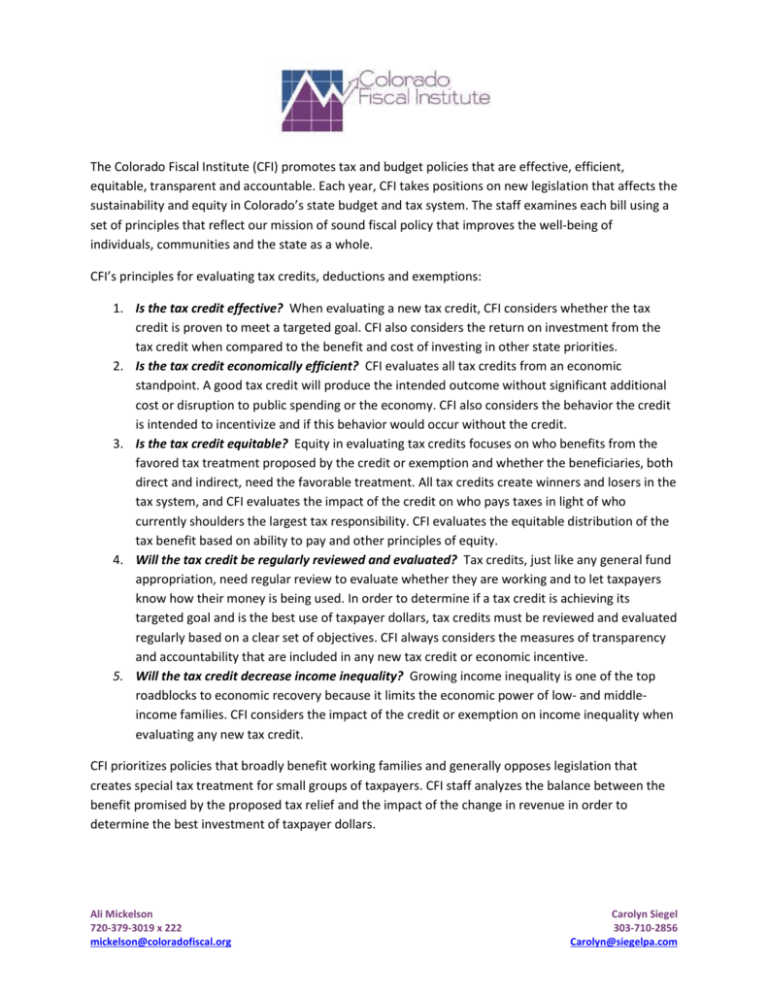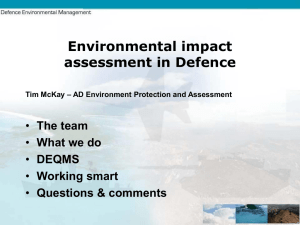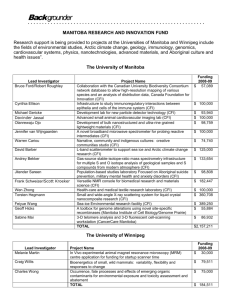CFI-Tax-Principles-2014-FINAL
advertisement

The Colorado Fiscal Institute (CFI) promotes tax and budget policies that are effective, efficient, equitable, transparent and accountable. Each year, CFI takes positions on new legislation that affects the sustainability and equity in Colorado’s state budget and tax system. The staff examines each bill using a set of principles that reflect our mission of sound fiscal policy that improves the well-being of individuals, communities and the state as a whole. CFI’s principles for evaluating tax credits, deductions and exemptions: 1. Is the tax credit effective? When evaluating a new tax credit, CFI considers whether the tax credit is proven to meet a targeted goal. CFI also considers the return on investment from the tax credit when compared to the benefit and cost of investing in other state priorities. 2. Is the tax credit economically efficient? CFI evaluates all tax credits from an economic standpoint. A good tax credit will produce the intended outcome without significant additional cost or disruption to public spending or the economy. CFI also considers the behavior the credit is intended to incentivize and if this behavior would occur without the credit. 3. Is the tax credit equitable? Equity in evaluating tax credits focuses on who benefits from the favored tax treatment proposed by the credit or exemption and whether the beneficiaries, both direct and indirect, need the favorable treatment. All tax credits create winners and losers in the tax system, and CFI evaluates the impact of the credit on who pays taxes in light of who currently shoulders the largest tax responsibility. CFI evaluates the equitable distribution of the tax benefit based on ability to pay and other principles of equity. 4. Will the tax credit be regularly reviewed and evaluated? Tax credits, just like any general fund appropriation, need regular review to evaluate whether they are working and to let taxpayers know how their money is being used. In order to determine if a tax credit is achieving its targeted goal and is the best use of taxpayer dollars, tax credits must be reviewed and evaluated regularly based on a clear set of objectives. CFI always considers the measures of transparency and accountability that are included in any new tax credit or economic incentive. 5. Will the tax credit decrease income inequality? Growing income inequality is one of the top roadblocks to economic recovery because it limits the economic power of low- and middleincome families. CFI considers the impact of the credit or exemption on income inequality when evaluating any new tax credit. CFI prioritizes policies that broadly benefit working families and generally opposes legislation that creates special tax treatment for small groups of taxpayers. CFI staff analyzes the balance between the benefit promised by the proposed tax relief and the impact of the change in revenue in order to determine the best investment of taxpayer dollars. Ali Mickelson 720-379-3019 x 222 mickelson@coloradofiscal.org Carolyn Siegel 303-710-2856 Carolyn@siegelpa.com CFI opposes the following bills because they violate the principles stated above by creating unfair preferential treatment of certain taxpayers, by encouraging policy that has been proven to be ineffective or inefficient or by increasing income inequality: Oppose Support HB 14-1012 – Advanced industries tax credit HB 14-1072 – Child care tax credit HB 14-1014 – Job growth incentive tax credit HB 14-1119 – Tax credit for the donation of food to a hunger-relief charitable organization HB 14-1094 – Sales tax holiday for school supplies HB 14-1097 – Sales tax holiday for the purchase of firearms HB 14-1106 – Income tax deduction for taxpayers who are penalized for violating the ACA minimum health insurance requirements HB 14-1178 – Sales tax exemption for property used in space flight SB 14-122 – Credit for tobacco sales to out-ofstate consumers Ali Mickelson 720-379-3019 x 222 mickelson@coloradofiscal.org Carolyn Siegel 303-710-2856 Carolyn@siegelpa.com











